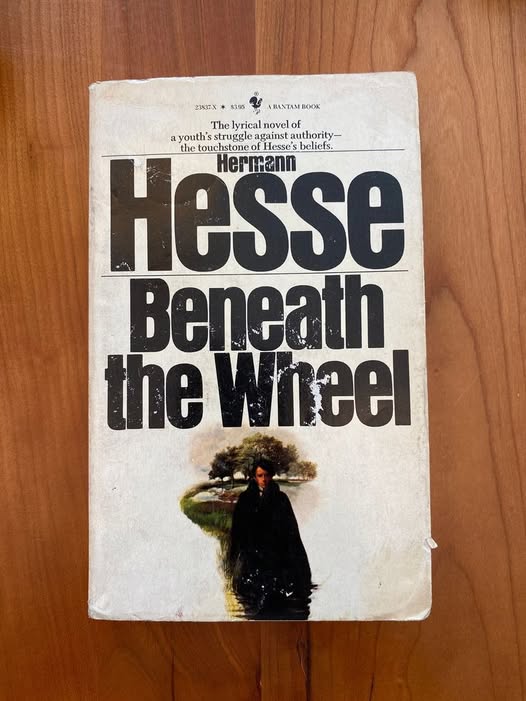Beneath the Wheel (1906) by Hermann Hesse is a raw and psychologically penetrating examination of youthful potential crushed beneath society’s unforgiving machinery. This semi-autobiographical novel unfolds with the slow, inevitable force of a Greek tragedy, chronicling how an entire system of expectations can methodically dismantle a sensitive young mind. Set against the backdrop of Wilhelmine Germany’s rigid academic institutions, the story follows Hans Giebenrath, a small-town prodigy whose natural intelligence becomes both his ticket to prestige and his eventual undoing.
Hesse, drawing from his own traumatic experiences in theological schools, constructs a narrative that functions as both character study and systemic indictment. We witness Hans’s transformation from a bright-eyed boy who finds wonder in fishing streams and reciting poetry to a hollowed-out scholarship student at Maulbronn Seminary, where every spontaneous impulse is disciplined out of him. The education system’s demands are portrayed as a kind of spiritual violence – each Latin conjugation and theological debate sanding away another layer of his humanity until nothing remains but exhausted compliance.
The novel’s brilliance lies in its nuanced portrayal of this erosion. Hesse doesn’t simply show the system’s cruelty; he demonstrates how it co-opts ambition and twists it against itself. Hans internalizes the pressure until he becomes his own jailer, ashamed of his fatigue, terrified of failure, yet increasingly unable to think or feel independently. His brief friendship with Hermann Heilner – the seminary’s resident rebel and free spirit – provides fleeting glimpses of what authentic intellectual life might look like, making his eventual collapse into apathy all the more devastating.
What makes Beneath the Wheel particularly unsettling is its contemporary resonance. Though written over a century ago, Hesse’s depiction of academic burnout, performance anxiety, and institutional indifference feels painfully modern. The “wheel” of the title isn’t just the German education system of 1900 – it’s any societal mechanism that values measurable achievement over human flourishing. Hans’s tragic trajectory – from promising student to broken young man – serves as a cautionary tale about the costs of confusing academic success with personal worth.
Hesse’s prose alternates between clinical precision and sudden lyrical outbursts, mirroring Hans’s own flickering moments of clarity amid his downward spiral. The novel’s final act carries the terrible inevitability of a train wreck observed in slow motion, as all possible escapes – friendship, nature, religion – prove inadequate against the weight of accumulated expectations. What begins as a conventional coming-of-age story transforms into something far darker: a demonstration of how society reproduces itself by breaking and reshaping the individuals within it.
More than just a period piece, Beneath the Wheel stands as one of literature’s most incisive explorations of how educational systems can extinguish the very curiosity they claim to cultivate. Its power lies not in dramatic confrontations but in the quiet, incremental destruction of a soul – a process rendered with such psychological authenticity that readers may find themselves recalling their own encounters with the grinding wheels of expectation. In an era increasingly preoccupied with metrics, testing, and standardized achievement, Hesse’s novel remains a vital counterargument – a reminder that some human qualities can’t be quantified, and some losses can’t be remedied.


